An important part of learning poker is understanding the terms used in the game, educational materials, and strategy discussions. There is a lot of terminology in the world of poker. Some terms reflect exactly what they mean in their name. While others have completely random names and carry unexpected meaning. There is also a lot of slang used in the poker community. Some of the slang has already become such a natural part of poker discussions that it has begun to be used everywhere along with basic terms.
On this page you can find a brief description of any poker terms. Also, please note that for some terms there are separate articles that explain their meaning in more detail and provide some relevant strategic advice. Such terms are highlighted in green color. Clicking on a term will take you to the related article. We also have a lot of examples, pictures, and videos relative to the specific terms.
A B C D E F G H I J K L M N O P Q R S T U V W X Y Z
A
Ace-High
A poker hand with an Ace as a highest card. Mostly related to the High card combination. For example, in Texas Hold’em game, if a player holds A♣ J♣, and the community cards are 9♥︎ 7♦ 8♣ Q♠ 3♦, the final hand is A♣ Q♠ J♣ 9♥︎ 8♣, which is Ace-high.
All In
When a player goes “All In”, it means that they put all of their remaining chips in the pot.
Ante
A small, mandatory bet all players put in before a hand starts to create a pot.
Add-On
In a tournament, it’s an option to buy more chips after the initial buy-in, usually at a set time.
Aggression
The frequency with which a player bets or raises instead of checking, calling, or folding. One of the main stats that are used by players in HUD.
B
Backdoor
Completing a hand with both the Turn and River cards, like making a flush by hitting the needed suit on the last two cards. For example, holding 5♦ 4♦ on a flop of A♦ T♥ 2♠ and hitting 7♦ and J♦ on the Turn and River.
Bad Beat
Losing a hand despite being a big favorite to win. It often involves an opponent hitting a very unlikely card. For example, having A♠ A♥ on a flop of A♦ 9♥ 9♠ and losing to 7♠ 6♠ when the dealer reveals 5♠ on fourth street and 8♠ on the River.
Players often go on tilt after bad beats.
Balance
The concept of playing the same way with both strong and weak hands to avoid being predictable. Balance is a part of the GTO strategy.
Bankroll
The total money a player has set aside for playing poker. Managing your bankroll well is crucial to avoid going broke. Use the reliable bankroll size calculator to figure out the safe size of your bankroll.
Big Blind (BB)
A forced bet placed by the player two seats to the left of the dealer in games like Texas Hold’em. The big blind position is the most unprofitable and difficult-to-play position in the game.
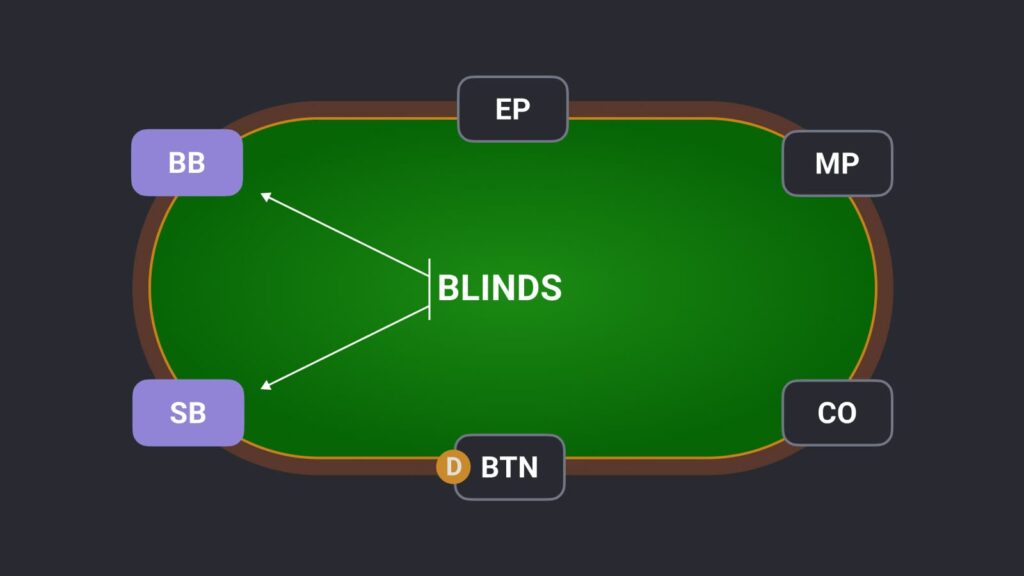
Bet
To put chips into the pot. A bet is the first chips put into the pot during a betting round. A basic action in a poker game.
Bluff
Betting or raising with a weak hand to make opponents believe you have a strong hand and get them to fold.
Board
The community cards in the middle of the table that all players can use to make their best hand in games like Texas Hold’em. Consists of Flop (the first three cards), Turn and River cards. For example, the board might be T♣ J♦ Q♠ 2♥ 9♠ .
Button
A marker that shows the dealer position. It moves clockwise after each hand, giving each player a turn at the dealer position. The button position is the most advantageous position at the table, as the player in this position is the last to act post-flop.
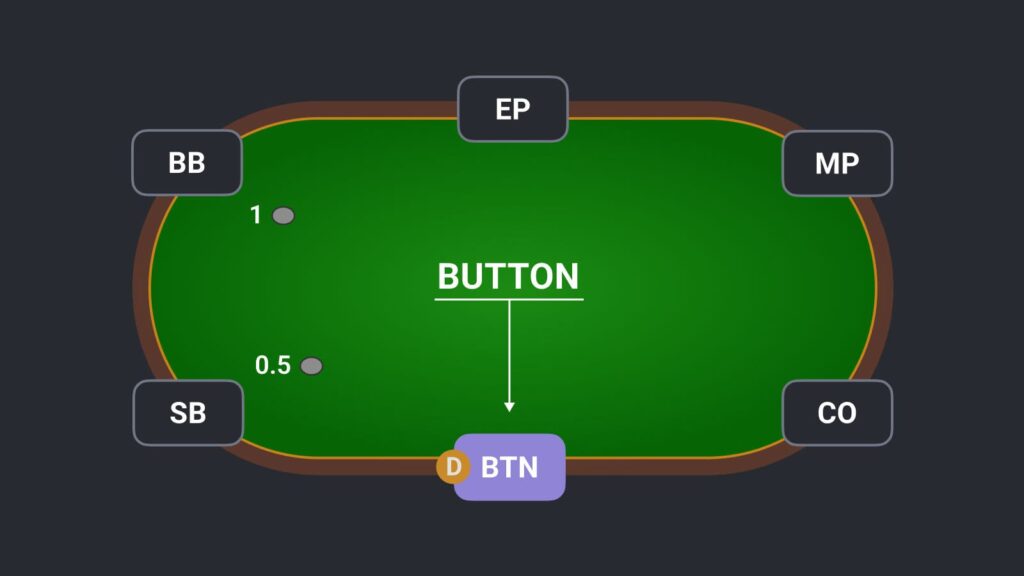
Buy-In
The amount of money required to join a poker game or tournament. In Cash games, it also determines your starting chip stack.
Bankroll Management
The strategy for managing your poker funds to minimize the risk of going broke.
Barreling
Continuously betting on consecutive streets (Flop, Turn, River) as a bluff or for value.
BB/100
Big blinds won per 100 hands. A metric used to measure a player’s win rate.
Blank, or “Brick” Card
A card that is unlikely to affect the strength of players’ hands. For example, if the board is K♠ Q♥ T♣ 8♦, a 2♣ on the River is likely a blank card.Blind vs. Blind (BvB)
A situation in which action takes place between players in the small and big blind positions.
Block Bet
A small bet made to prevent an opponent from making a larger bet. For example, a player holding 7♣ 6♦, and the board comes A♥ 9♥ 6♠. Player acts first and decide to make a super small bet with the size of 10% of the pot, trying to “block” the opponent’s opportunity to make a larger bet. Recreational players often use this technique when they’re not sure in the strength of their hand.
Board Texture
The composition of community cards and how they might interact with players’ hands. For example, a board of T♠ J♠ Q♦ is a very coordinated texture, meaning that there are a lot of draws possible. Coordinated texture usually attracts way more bets and raises from the players. The opposite example is A♥ 9♣ 2♦ , which is a dry board texture. On a dry board, players usually are less aggressive, because nobody is scared of the opponent’s hand improvement.
Bounty
A reward paying for knocking out a particular player from a tournament.
Broadway
A straight from Ten to Ace. For example, T♠ J♦ Q♣ K♥ A♠ .
Bubble
The point in a tournament where the next player out does not take any winnings. The remaining players will take something away from the table. Example: The tournament you are in states that the top 25 players will win money and there are 26 players left. These 26 players are “on the bubble”. The next player out will be a “bubble boy”, meaning he’s the last one who left the tournament without money.
Big Slick
A nickname for the starting hand Ace-King of any suits in Texas Hold’em. For example, A♥ K♠.
Blocker
A card that reduces the number of possible strong hands your opponent could hold.
Bluff catcher
A hand that can only win if the opponent is bluffing.
Board coverage
Ensuring your range of hands can hit various board textures, making it harder for opponents to know your hand strength.
Bullets
A nickname for pocket aces starting hand in Texas Holdem. For example, A♦ A♣.
C
Call
Matching the current bet in a betting round. Calling keeps you in the hand and allows you to see the next card or go to Showdown.
Check
Passing the action to the next player without betting. You can only check if no one has bet in the current round.
Check-Raise
Checking initially to lure an opponent into betting, then raising their bet to increase the pot. For example, you called an open raise Pref-flop on the Big blind position with 9♠ 8♠ against a player on the Button. The Flop comes Q♦ T♠ 4♠ . You decide to check-raise with your draw to put pressure on your opponent.
Community Cards
Same as “Board”. Cards dealt face-up in the center of the table, shared by all players to make their best possible hand in games like Texas Hold’em. For example, the community cards might be A♠ 8♦ 9♠ 2♣ J♠.
Connectors
Two consecutive cards in rank, like Q♠ J♦, or 8♥ 7♠. Connectors are often played to try to make straights.
Cutoff
The position to the right of the dealer button. Cutoff is considered a strong position because of the late betting advantage.
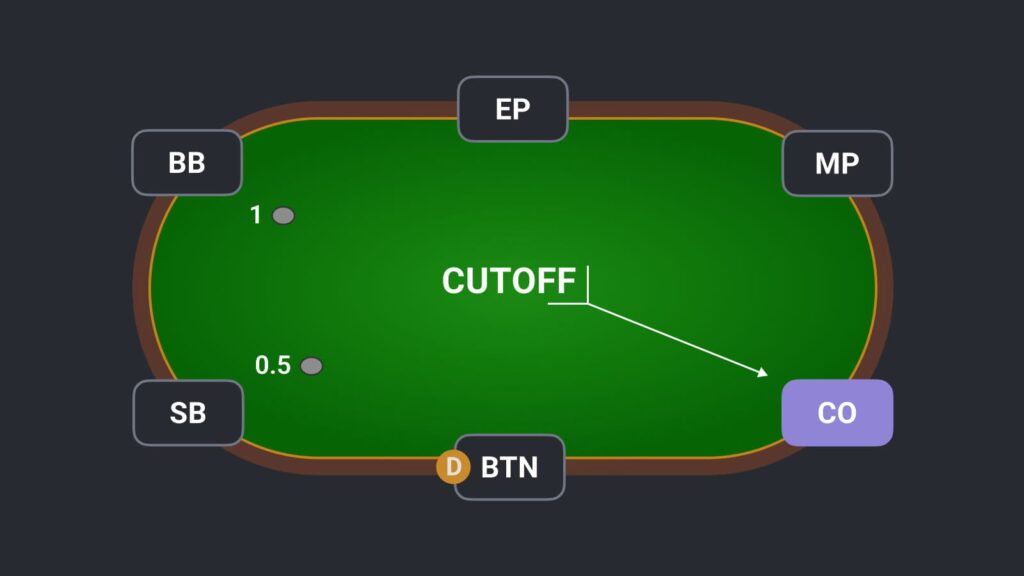
Chip EV
Expected value in terms of chips. Chip EV is used to evaluate decisions in tournaments.
Chip Leader
The player with the biggest stack for a current moment in a poker tournament.
Cold Call
You make a cold call if before calling you didn’t invest any money in the pot. For example, a player in the Under-the-gun position makes an open raise Pre-flop, and you make a call on the Button. You just made a cold call.
Continuation Bet
A bet made by the Pre-flop aggressor on the Flop, regardless of whether the Flop improves their hand. For example, you’re in the Hijack position holding A♠ K♥. A recreational player on the Under-the-gun position limps, you make a raise, everyone else folds, and UTG player makes a call. The Flop comes A♠ 7♦ 2♥, UTG player checks and you place a bet. This bet is called a continuation bet, as you continue your Pre-flop aggression.
Cooler
A situation where a strong hand loses to an even stronger hand in a manner that’s difficult to avoid. The most typical poker cooler is losing with K♦ K♣ against A♠ A♥ when both players go all-in Pre-flop.
Call the clock
When a player requests a time limit for another player to make a decision.
Calling station
A player who calls frequently and often reaches showdown with weak and medium-strong hands. As an exploit strategy, it is recommended to bluff less and value bet more against such opponents.
Cash game
A poker game where chips represent real money. Unlike the tournament game, players can choose to enter and leave the table as they desire.
Cash-out
To leave a game and exchange chips for money.
Chip dumping
The act of intentionally losing chips to another player, often in collusion.
Chop
Splitting the pot between two or more players, usually when hands are of equal strength.
Click back
Small raise, typically the minimum allowable raise.
Combo draw
A hand that has multiple drawing possibilities, like a straight + flush draw, or a weak pair + draw. (Often overlooked, but pairs are also draws, to two pair or trips. Or in the case of a pocket pair, a draw to a set.)
Cowboys
A nickname for pocket kings starting hand. For example, K♦ K♣.
D
Dealer
The person who is dealing the cards in a poker game. In home games, the player in the Button position has a dealer role.
Deep Stack
A large stack of chips relative to the average stack in a tournament. In cash games, a deep stack is usually a stack bigger than 200 big blinds.
Delayed C-Bet
A continuation bet made on a later street rather than the Flop. For example, you raise pre-flop with A♣ 5♣ and get one caller. The Flop comes A♠ 7♦ 2♥ and the action goes check-check. Then Turn card is T♥, your opponent checks again and now you make a bet. This bet is called a delayed continuation bet.
Donk Bet
A bet made by a player out of position, when they weren’t the aggressor in the previous round. For example: a player on the big blind calls a pre-flop raise from the early position player with 7♠ 8♠. The Flop comes 7♣ 6♦ 2♥. The standard play here would be check to the preflop aggressor. But a player decides to make a bet – this bet is called a “donk” bet. This trick is mostly used by recreative players. Professional players mostly prefer checking when they don’t have a betting initiative.
Draw
A hand that needs specific cards to improve to a strong hand. For example, holding 5♠ 4♠ with a 6♠ 7♣ 2♦ Flop is a straight draw. You need a 3 or an 8 to come on the Turn or the River to complete a straight. A card that you need to complete your draw is called “out”. In our example you have 8 outs to make a straight: 3♣ 3♠ 3♥ 3♦ 8♣ 8♠ 8♥ 8♦.
Dead money
Chips in the pot that do not belong to active players, typically from players who have already folded.
Deuce
Deuce refers to any 2 in the deck – 2♣ 2♠ 2♥ 2♦.
Domination
A situation where one hand is heavily favored over another because they share a card of the same rank. For example, A♦ K♥ is “dominated” by A♥ A♠ as it only has 6.8% equity pre-flop.

Downswing
A losing streak in poker, often due to variance or bad luck.
Drawing dead
You’re drawing dead if you cannot win the hand, no matter what cards come on the next streets. For example, you have J♥ 9♥ and your opponent has 5♣ 5♠. The community cards now are A♥ K♠ K♥ 5♦. You might hope to hit your flush on the River, but you’re already drawing dead, because your opponent has a full house – the combination you cannot beat, whatever card comes on the last street.
E
Early Position (EP)
The seats to the left of the big blind in a poker game. Considered disadvantageous because you act in the beginning of a betting round, not having enough information about other players. There is 1 early position in a 6-max game (EP), and 3 early positions in a 9-max game. Early positions are also called “under-the-gun” positions.
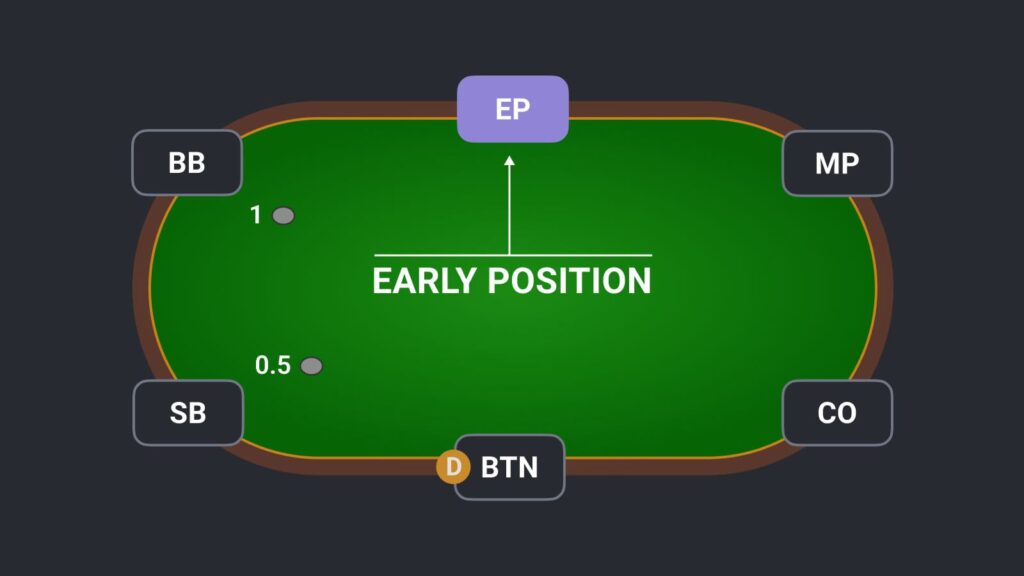
Effective Stack
The smallest of the chip stacks involved in a hand. For example, if one player has 10,000 chips and another has 6,000, the effective stack is 6,000. The point of the effective stack is to show how much money is currently in play between players. In the example given, each player can win or lose not more than 6,000 chips.
Equity
The share of the pot that belongs to a player based on the probability of winning. For example, if you have a 25% chance of winning a pot of $100, your equity is $25. Sometimes your odds of winning are also called “Equity”. For example, pocket aces A♣ A♠ have 81% equity against pocket kings K♥ K♦ pre-flop.

Equity Realization (EQR)
Equity Realization (EQR) refers to how effectively a hand converts its theoretical equity into actual value. When a hand wins more frequently than its equity would predict, it is said to “over-realize” its equity. Conversely, when a hand wins less often than expected based on its equity, it is said to “under-realize” its equity. Mathematically, equity realization is typically defined as EQR = pot-share / equity, where pot-share is the expected percentage of the pot a hand will win according to its expected value, and equity is the raw equity of a hand if checked to showdown. For example, a hand that wins (on average) 60% of the pot, which only has 30% raw equity, has an equity realization factor (EQR) of 0.6 / 0.3 = 200%.
Exploit
To take advantage of an opponent’s weaknesses. This is the fundamental aspect of poker strategy that will make you the most money.
Expected Value (EV)
The average amount a player expects to win or lose on a particular action in the long run. Positive EV indicates a profitable play, while negative EV indicates a loss. Fold’s EV is always 0.
F
Face card
A card that has a face on it: King, Queen, or Jack.
Family pot
A hand in which all the players are still in the pot after pre-flop round, and go to see the Flop together as a “family”.
Flip
A situation where two hands have equal or close to equal equity, making it a “coin flip” to see who wins.
Full boat
A nickname for a full house.
Full ring
A poker game played with 9 or 10 players.
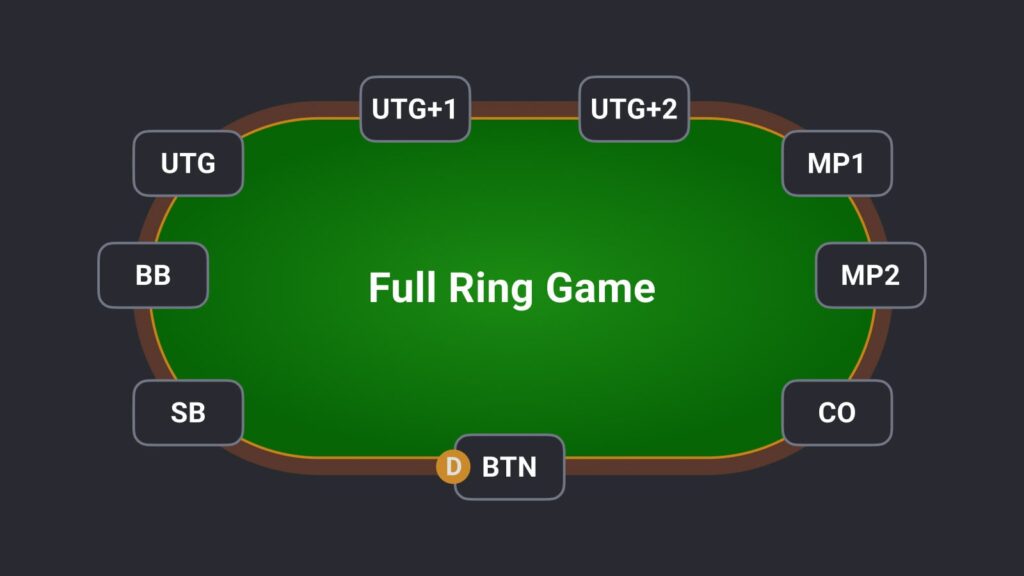
Field
The group of players playing the same place, most often a particular tournament, or a particular poker site. For example: PokerStars high stakes players field is tough to beat.
Final Table
The last table in a poker tournament, where the remaining players compete for the top prizes.
First In
The first player to voluntarily put money into the pot in a betting round.
Fish
A weak or inexperienced player who is likely to make mistakes and lose money. “Fish” is a slang term some of the players find offensive. The more polite form is a “Recreational player”.
Flat Call
To call a bet with a hand that is strong enough for raising. For example, a player has A♠ Q♠ on the Button. An opponent on the Cutoff seat makes an open raise, and a player decides to make a flat call, even though the standard play here would be 3Bet for value.
Float
Calling a bet with a weak hand to bluff on a later street. For example, calling a Flop continuation bet with K♥ 7♥ on a T♥ 9♣ 2♦ board and betting if the Turn is checked to you.
Flop
The first three community cards dealt face-up in games like Texas Hold’em. For example, the Flop might be J♠ 8♠ 6♦.
Flush
A hand with five cards of the same suit. For example, A♥ Q♥ T♥ 9♥ 6♥.

Fold
To discard your hand and give up any chance of winning the current pot. Folding might seem like a sign of weakness, but learning to fold in the right situations is one of the key skills that will save you a lot of money.
Fold Equity
The potential for a bet or raise to cause opponents to fold, allowing you to win the pot without a Showdown.
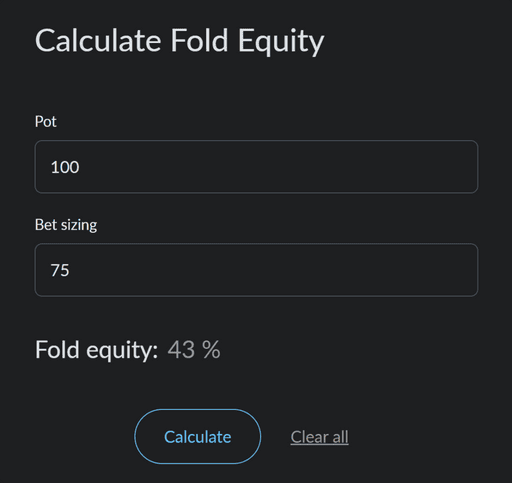
Four-Bet
The fourth bet in a betting round. Note that on the Pre-flop, Big blind is considered as a first bet. For example, a player in the middle position makes an open raise with A♥ K♥. Then, a player on the Button makes a re-raise (3bet) with Q♣ Q♠. The action goes back to the original raiser in the middle position, and they decide to make another re-raise (4bet).
Freezeout
A tournament format where players are eliminated when they lose all their chips, with no rebuys or add-ons.
Full House
A hand consisting of three of a kind and a pair. For example, K♥ K♦ K♠ J♥ J♠.
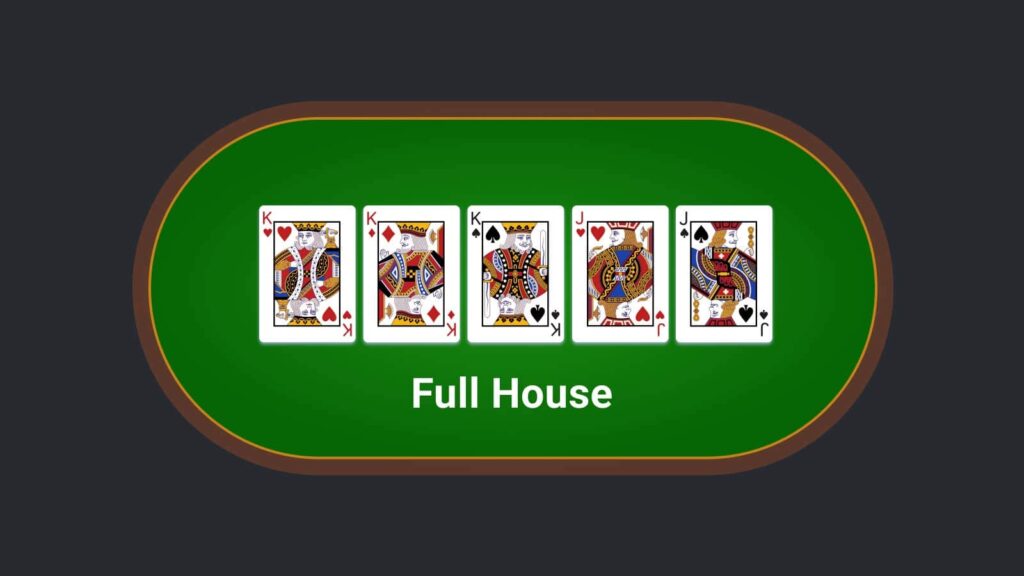
G
Gapper
A hand where the ranks of the cards are not consecutive, but still very close, so the hand has the potential to make a Straight. For example, 9♥ 7♠ (a “one-gapper”) or J♦ 8♦ (a “two-gapper”).
Game Theory Optimal (GTO)
A theoretically perfect strategy that makes a player unexploitable. Professional players use special poker tools to study GTO strategy, such as GTO Wizard.
Grinder
A player who plays poker regularly and makes a modest but steady profit over time.
Gutshot Straight Draw
A draw where you need a card of one specific rank to complete a straight. For example, holding 5♠ 4♠ on a 6♦ 8♣ K♠ Flop, you need a 7 of any suit (7♣, 7♠, 7♥, or 7♦) to complete a straight on later streets.
H
Hand History
A record of the actions in a hand, often used for analysis and improving play.
Heads-Up
A situation where only two players are involved in the hand or tournament.
Hero
The player whose perspective is being used in a hand history or analysis.
Hero Call
A call made with a weak hand, based on the belief that the opponent is bluffing. For example, calling a large river bet with A♣ 3♣ on a 7♥ J♣ 5♠ 9♠ T♣ board.
High Card
The weakest poker hand without any pairs, straights, or flushes. For example, A♥ J♣ 9♠ 7♣ 6♥ is an Ace-high hand.
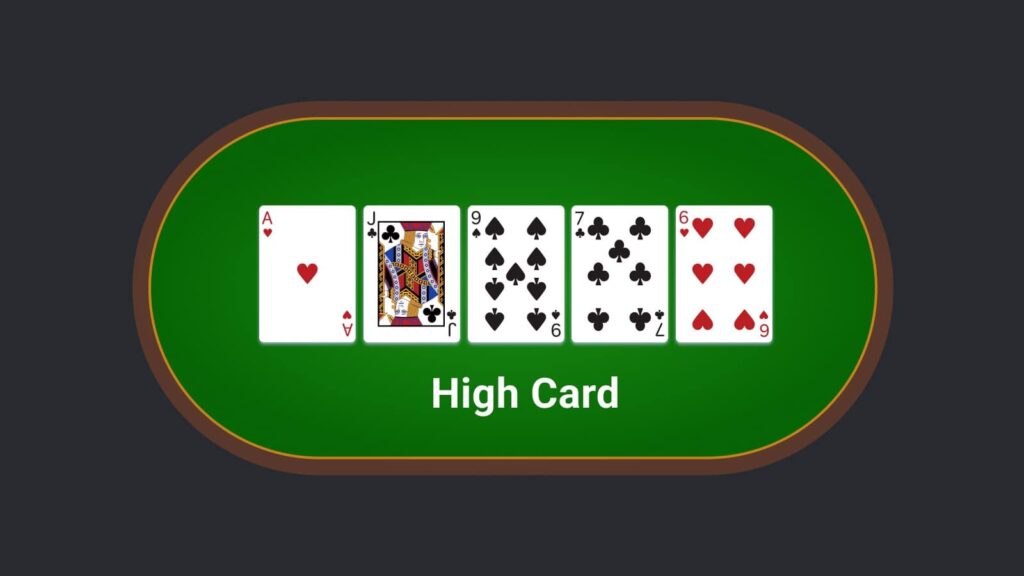
Hijack
The position two seats to the right of the dealer button. The second most advantageous position in poker, after the Button.
Hole cards
The cards dealt face down to each player in a poker game. In Texas Holdem rules, you’re dealt two cards face down at the beginning of the hand. These two cards are called “hole cards”, or your “starting hand”.
I
ICM
Independent Chip Model, a method used to calculate a player’s equity in a tournament based on their chip stack.
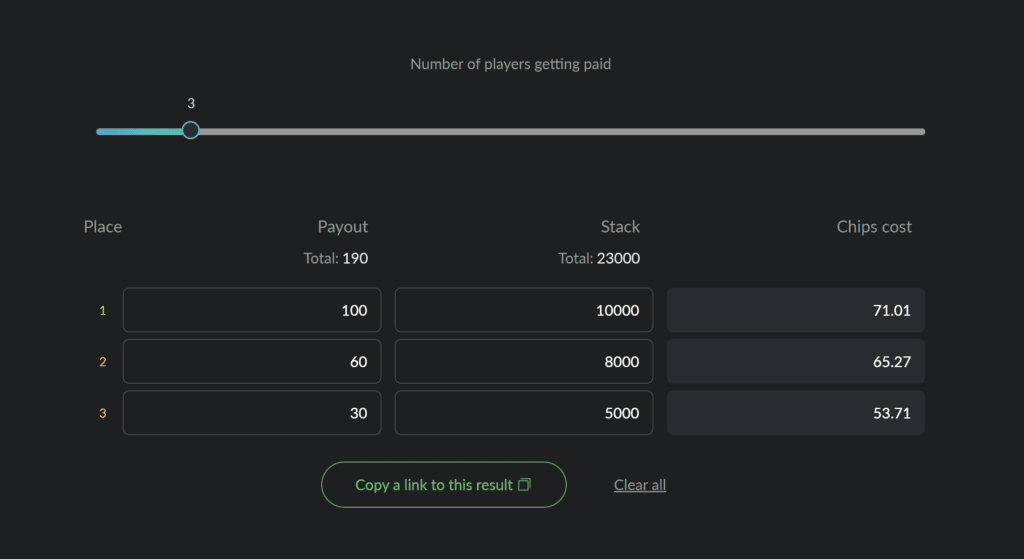
Inside straight draw
A draw where only one specific card rank will complete a straight. For example, on 6♥ 8♦ A♠ board player holding T♥ 9♠ has an inside straight draw to a 7.
Isolation Raise (ISO)
A raise made against limpers, to isolate a weaker player. For example, raising with A♠ J♠ after a loose player limps before you.
Implied Odds
Extension of the pot odds concept. When calculating pot odds, you are figuring out the profitability of a call at the current point in the hand. Implied odds also take into account the potential winnings on future streets if you hit your draw.
In Position
You’re “in position” if you act after your opponents in a betting round. It gives you more information on their actions.
J
Jackpot
A special bonus prize offered in some poker rooms for specific hands or bad beats.
Jammed Pot
A pot with a lot of betting and raising, resulting in a large amount of chips in the middle.
Jam
To go all-in, betting all of your remaining chips.
Junk
A weak hand with little potential for improvement. For example, 7♣ 2♦ is considered junk.
K
Kicker
The highest unpaired card that helps determine the winner in situations where players have similar hands. For example: you have A♠ Q♠ and your opponent has A♦ J♣ on a board of A♥ 9♣ 4♠ 6♠ 2♦. You both have an Ace-high combination, but your Queen kicker would win the hand.
Knockout Tournament
A tournament where you earn a bounty for each player you eliminate.
L
LAG
Loose Aggressive, a playing style characterized by playing a lot of hands and frequently betting or raising.
Late Position
Cutoff and Button seats at the poker table. Considered advantageous because you act later in the betting round, having more information on your opponents.
Lead
To make the first bet in a betting round, if no one has betting initiative at this moment of a hand. For example, a few players limped pre-flop. Then, one player places a bet on the Flop. This bet is called a Lead.
Limp
To call the minimum bet rather than raising, usually in the first betting round. For example, in Texas Hold’em, calling the big blind pre-flop is limping.
Loose
A style of play characterized by playing a wide range of hands. For example, a loose player might play hands like T♦ 5♣ and 7♠ 4♠ frequently.
Laydown
Same as “Fold”. This form is usually used when talking about folding a strong hand. For example, “He folded Kings against Aces pre-flop, he made a great laydown!“.
Leveling
Leveling comes from the idea of thinking in progressively deeper levels.
- Level 1: How strong is my hand?
- Level 2: How strong is my opponent’s hand?
- Level 3: How strong do they think my hand is?
- Level 4: How strong do they think I believe my hand is?
- And so on.
Linear Range
A range structure made up of the strongest hands in a top-down fashion. A linear range typically includes hands from premium to medium strength, or from strong value to thin value hands.
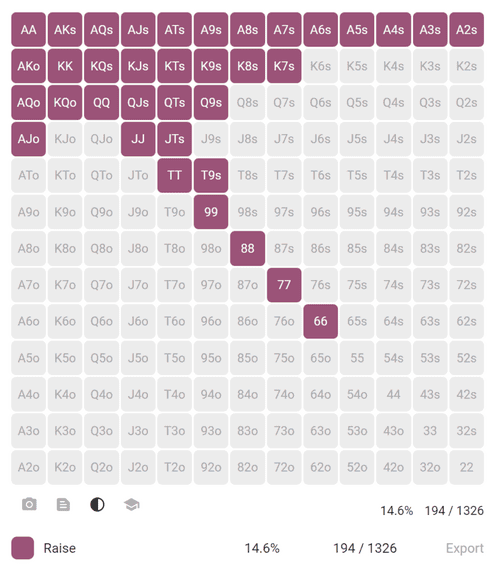
Live poker
Poker played in a physical location (not online).
M
Maniac
A term used to describe a highly loose and aggressive player who is generally regarded as weak.
MDA
Mass Data Analysis. Analyzing large databases to study the tendencies of different groups of players and then exploiting their leaks at the tables.
Mental Game
The psychological aspect of poker. It includes managing tilt, maintaining focus, and making rational decisions.
Microstakes
The smallest stakes available in online poker rooms, referred to as “micro”. In cash games, micro limits are games where the big blind is no more than 25 cents.
Middle Pair
A pair made with one of the middle-ranked cards on the board. For example, holding 9♠ 8♠ on a board of K♦ 9♦ 5♣, you have a middle pair.
Middle Position (MP)
The seats in the middle of the table, neither early nor late position. There is 1 middle position in a 6-max game, and 2 middle positions in a 9-max format.
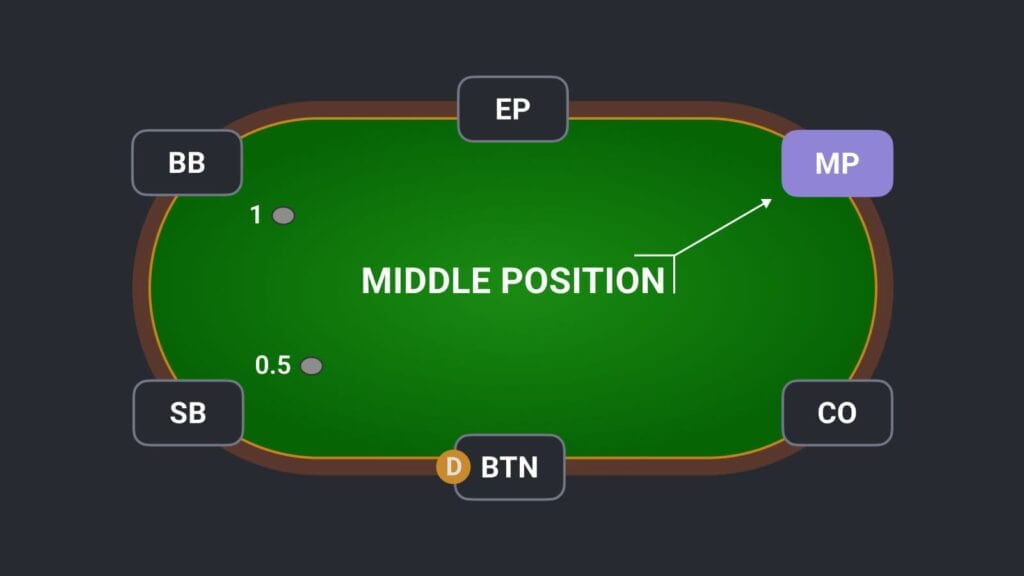
Mixed Strategy
A strategy that involves varying your play to avoid becoming predictable.
Monotone
A board with three or more cards of the same suit. For example, K♥ 9♥ 3♥ is a monotone Flop.
Monster
A very strong hand, typically an A-high flush or better.
Muck
To discard one’s cards without showing them to the table, typically done at showdown when a player hasn’t won the hand. The term can also be used, less frequently, as a synonym for “fold.”
Multi-Table Tournament (MTT)
A tournament with many tables of players, where tables are consolidated as players are eliminated.
Multiway pot (MWP)
A hand involving three or more players.
N
Nash Equilibrium
A strategy where no player can improve their outcome by changing their strategy while others stick to theirs. This mathematical concept is used in GTO strategy calculations.
Nit
A player who plays very conservatively and only with the strongest hands.
No Limit
A poker format where players can bet any amount of chips, up to their total stack.
Nuts
The strongest possible hand for the current moment of a hand. For example, on a board of 7♥ 4♠ 2♦ T♥ J♦, any player holding a combination of 9-8 would have the “nuts”, or “nut straight” in this case.
O
Odds
Mathematical probability that a certain event will occur. Mostly used as the probability of winning a hand, and also in the term “pot odds”.
Offsuit
Refers to a starting hand where the two hole cards are of different suits. For example, A♠ K♦ is an offsuit hand.
Open-Ended Straight Draw (OESD)
A draw where you need one of two possible cards to complete a straight. For example, holding 8♠ 7♠ on a board of 5♦ 6♣ K♠, you need either a 4 or 9 to complete your straight.
Open
The first voluntary chip investment in the pot in a betting round. For example, in Texas Holdem, the first raise pre-flop is called an “open raise”.
Out Of Position (OOP)
Disadvantageous position at the table when you need to act before your opponents.
Overbet
Betting more than the current size of the pot. For example, betting $150 into a $100 pot is an overbet.
Overcard
A card higher than any card on the board. For example, holding A♠ Q♠ on a 9♦ 7♣ 4♠ flop means you have two overcards.
Overpair
A pocket pair higher than any card on the board. For example, holding Q♥ Q♦ on a T♥ 8♠ 5♦ board means you have an overpair. In poker hand rankings it’s still considered as “one pair”. In practice, this hand is way stronger than a pair that connects to one of the community cards.
Omaha
A poker variant where players are dealt four hole cards and must use exactly two with three community cards.
Open limp
The first player to enter the pot by calling the big blind rather than raising.
Outs
Cards that will improve your hand to what you believe will be the best hand. For example, you’re holding 7♥ 6♦ and the board is A♣ 3♥ 4♣ Q♦. You have a straight draw. Any 5 will give you straight, so you have 4 outs to complete your draw on the River: 5♣ 5♠ 5♥ 5♦.
Overcall
Calling a bet after one or more players have already called.
Overlimp
Limping after one or more players have already limped.
P
Pair
A hand containing two cards of the same rank. For example, A♥ A♣ is a pair of Aces.
Passive
A playing style characterized by mostly checking and calling rather than betting or raising.
Pocket Pair
A starting hand with two cards of the same rank. For example, if you’re dealt 9♦ 9♠ in Texas Holdem, you have a pocket pair of nines.
Polarized Range
A range of hands that consists of very strong hands and bluffs, with few or no hands of medium strength.
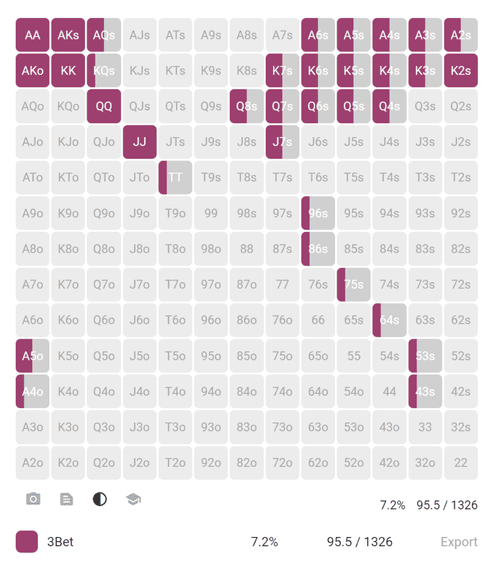
Position
The order in which players act during a hand. Each position at the table has its own name and strategy nuances. Being “in position” means acting after your opponents, while being “out of position” means acting before them.
Post-Flop
Refers to the action that takes place after the Flop has been dealt.
Pot
The total value of chips that have been bet in the present moment of a hand.
Pot odds
The ratio of [the size of the bet a player is facing] to [the size of the pot]. For example, a player facing a half-pot bet can call, risking 0.5 to win 1 (the pot) and 0.5 (their opponent’s bet), and therefore the pot odds are 3:1. They need to win the pot in 1 / (3+1) = 25% cases to break even on a call. It’s more convenient to see pot odds in %, so you can compare them to your hand’s equity.

Pre-Flop
The action that takes place before the flop is dealt. It’s a crucial stage of a hand often overlooked by the players. To structure a preflop strategy, players often create preflop charts.
Probe bet
A bet made on the Turn by the player who is out of position and doesn’t have a betting lead, after the continuation bet on the Flop was skipped by the pre-flop aggressor. For example: player A open raises pre-flop on the Button, player B makes a call on the Big blind. The Flop action goes check-check. On the Turn player B decides to take the initiative and places a bet. This bet is called a “probe bet”.
Push
Another “all-in” term variation. Putting all your remaining chips into the pot.
Payout structure
How prize money is distributed in a tournament. It indicates the percentage of the prize pool allocated to each finishing position.
Pocket aces
A pair of aces as your hole cards. For example, A♣ A♥.
Pocket rockets
Another nickname for pocket aces.
Poker face
A neutral face expression that gives no information about the strength of your hand.
Pot-committed
When you have invested so many chips in the pot that folding becomes unwise.
Pre-flop Raise (PFR)
The act of raising before the community cards (flop) are dealt. PFR % is one of the main stats poker players include in their HUD.
Progressive Knockout Tournament (PKO)
In poker, a Progressive Knockout (PKO) tournament is a format where part of the buy-in contributes to a bounty on each player’s head. In PKO tournaments, when a player eliminates another, they usually receive a cash prize equal to half of the eliminated player’s bounty. The remaining half of the bounty is added to their own head, making it available for other players to claim. If multiple players are involved in a split pot, the bounty is distributed equally among them. Additionally, some sites like Pokerstars offer PKO tournaments where two-thirds or even the entire prize pool is allocated to bounty prizes.
Q
Quads
A slag name for the “Four of a kind” poker hand. For example, holding Q♠ Q♦ and the board is Q♣ Q♥ 2♠ 9♦ 7♠, you have quads.
R
Rainbow
Refers to cards of different suits, making a flush and flush-draw impossible. For example, a flop of 8♠ 6♦ 2♣ is called a “rainbow flop”.
Raise
An action that increases the size of the bet when already facing a bet.
Range
The set of hands a player might have based on their actions in a hand. For example, here is a typical range of hands players have when open raising from an early position.

Rake
The small percentage of the pot taken by a casino or a poker room as a fee for hosting the game.
Rakeback
If you register at a poker room through an affiliate, the room pays the affiliate a portion of the rake generated by you as a reward for attracting a new client. Affiliates, in turn, sometimes share part of their profits with players. By choosing a good affiliate, you can ensure yourself a constant additional profit with the help of rakeback.

Re-Raise
To raise after an initial raise has been made. For example, if Player A bets $10, Player B raises to $30, and you raise to $70, that’s a re-raise.
Resteal
A preflop 3-bet from the blinds against a late position open raise. The opening raise attempts to “steal” the pot, while the “resteal” attempts to take down the opener’s raise preflop. For example, a player on the Button makes an open raise, and a player on the Small blind 3bets. This 3bet is called “re-steal”.
Return On Investment (ROI)
The aggregate money won, divided by tournament entry fees. If you have paid $1000 in entry fees, and won $2000 total, your return on investment (ROI) is 200%. This metric is often used to evaluate the long-term performance of tournament players.
River
The fifth and final community card dealt in games like Texas Hold’em. For example, on the board of 8♠ 7♦ 4♣ J♥ 9♣, the River is 9♣.
Runner-Runner
Hitting needed cards on both the Turn and the River to complete a hand. For example, holding 9♠ 8♠ on a board of Q♣ 4♠ 3♥ and hitting 6♠ on the Turn and 7♠ on the River to complete a flush.
Rebuy
The option to buy more chips after being eliminated or losing all chips in a cash game or a tournament.
Reverse implied odds
The opposite of implied odds, these estimate the potential loss a player might incur if they complete their hand but their opponent ends up with an even stronger hand, thereby increasing the likelihood of a significant chip loss.
Royal Flush
The highest possible hand in poker (Ace, King, Queen, Jack, Ten, all of the same suit).
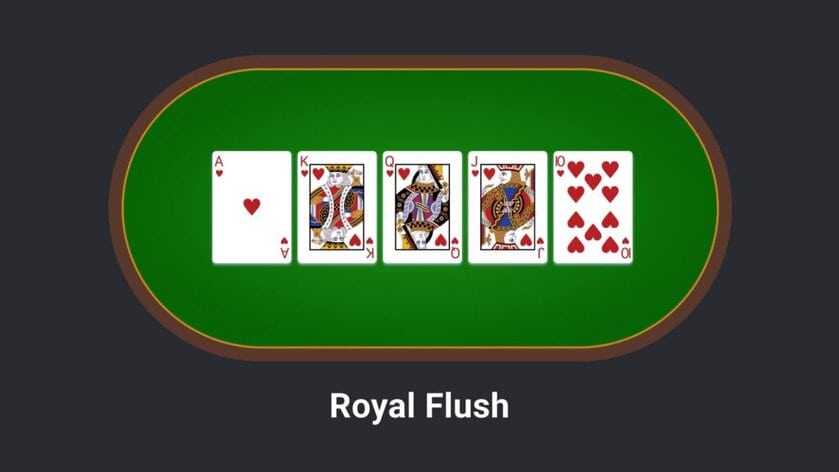
Run it twice
Dealing the remaining streets two times. Each time a half of the pot is in play. Typically done in all-in situations in cash games to reduce variance.
S
Semi-Bluff
A bet or raise made with a hand that is weak now but has the potential to improve. For example, betting with 5♦ 4♦ on a board of 6♠ 8♣ 2♦ is a semi-bluff. Right now you have nothing, but your hand can improve to a straight on later streets, if you hit a 7.
Set
Three of a kind made with a pocket pair and one matching community card. For example, holding 7♠ 7♦ on a board of 7♣ 4♠ 2♥ means you have a set of sevens.
Shove
A slang word meaning go all-in, betting all your remaining chips.
Short Stack
A player with a relatively small number of chips compared to the blinds level and other players stacks at the table.
Showdown
The point at the end of a hand after all the betting rounds completed. The remaining players reveal their hole cards to compare their final combinations and determine the winner.
Side Pot
A separate pot created when one player is all-in and other players continue betting. For example, if three players are in a hand and one goes all-in, the main pot is contested by all, and any further bets go into a side pot contested by the remaining players.
Slow Play
To play a strong hand in a way that under-represents its strength, often by checking or calling instead of betting or raising, in order to trap opponents into betting.
Small Blind
The smaller of the two forced bets that must be made before the cards are dealt, usually half the size of the big blind.
Split Pot
A pot that is divided between two or more players because they have equivalent hands. For example, on the showdown, you show A♣ 2♣ and your opponent reveals A♥ 5♦. With the board of A♠ 9♦ 9♣ K♣ Q♥, you’ll spit the pot, because you both have the same combination: two pairs of Aces and Nines with a King kicker.
Squeeze
A preflop play whereby a player raises after one player has made an open raise, and one or more players have called that raise. For example, player A open raises from Lowjack position, player B calls on the Button, and player C makes a re-raise from the Small blind. Player C just made a Squeeze. Squeeze is a variation of a 3bet.
Stack
The total number of chips a player has at the table.
Steal
A pre-flop open raise made from the late positions. Players typically open raise with a wide range of hands from late positions to “steal” the blinds.
Straddle
An optional blind bet made by the player to the left of the big blind before the cards are dealt, often double the big blind. Straddle allows a player to act last in the pre-flop betting round.
Straight
A hand consisting of five consecutive cards in rank. For example, 9♥ T♥ J♠ Q♥ K♠ is a straight.
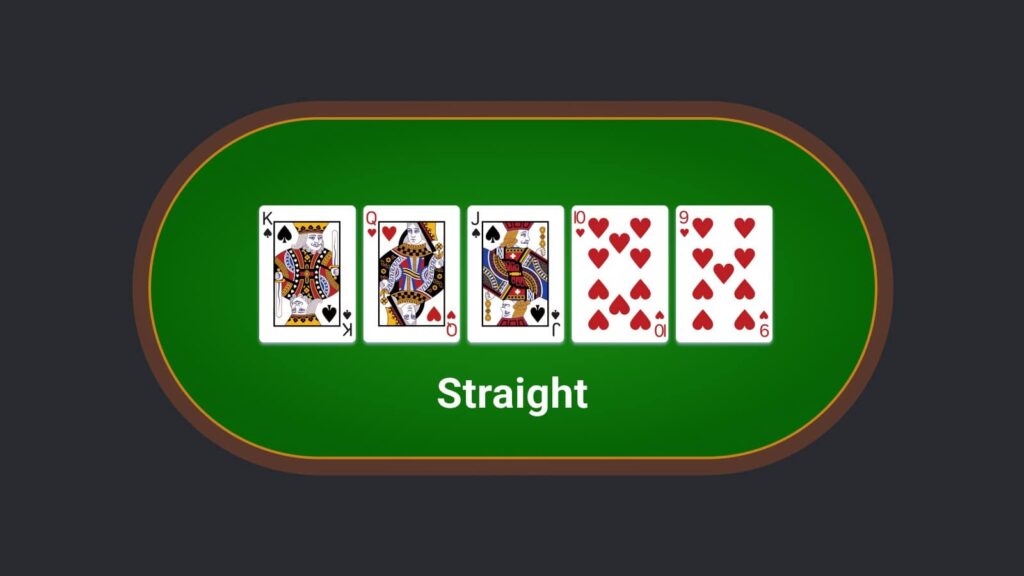
Straight Flush
A hand consisting of five consecutive cards of the same suit. For example, 6♥ 7♥ 8♥ 9♥ T♥ is a straight flush.
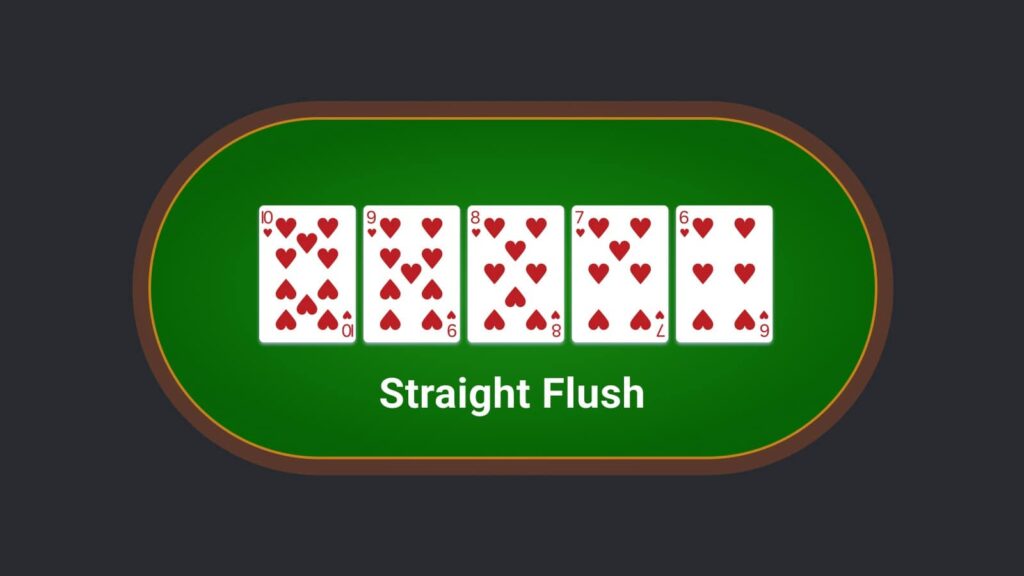
Satellite
A tournament where the prize is entry into a larger tournament rather than cash.
Second pair
Pairing one of your hole cards with the second-highest card on the board. For example, you hold K♣ Q♥. On a board of A♦ K♥ 7♦, you have a second pair.
Session
A continuous period of time spent playing poker. For example: Today I had a 4-hours session and played 300 hands.
Shark
A highly skilled poker player.
Short-Handed
A poker table with 6 or less players.
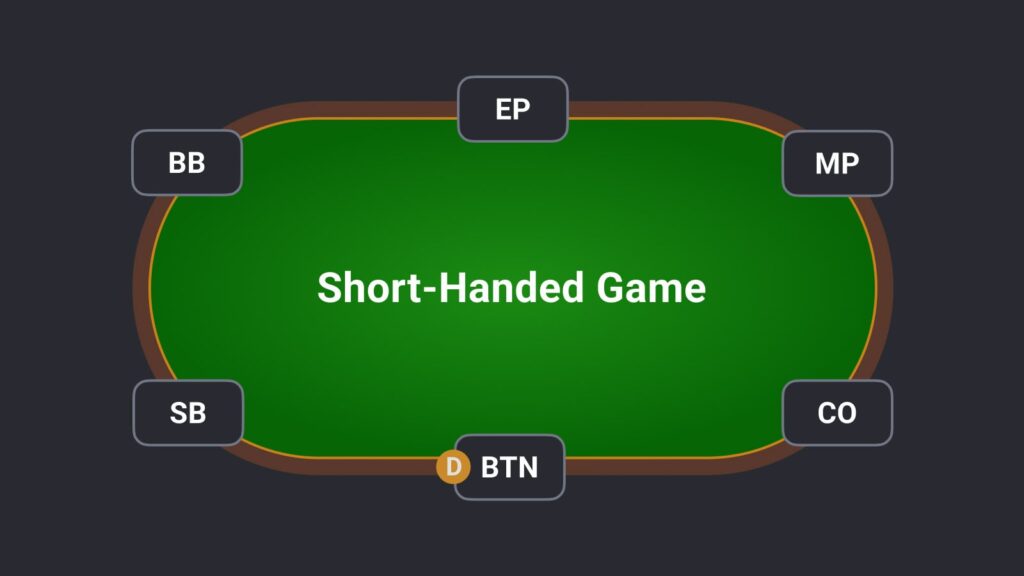
Showdown value
A hand with a reasonable chance of winning at showdown without improvement. Typically referring to a medium-strength hand as opposed to a very strong value hand or a very weak hand.
Single-raised pot
A pot where there has only been one pre-flop raise.
Sit-and-go (SNG)
A tournament that starts once a set number of players have registered.
Slow roll
The act of delaying revealing a winning hand at showdown, considered poor etiquette.
Smooth call
Calling a bet with a strong hand rather than raising, often to disguise the strength of your hand.
Solver
A software tool used to find the theoretically optimal strategy for various poker situations.
Stakes
The amount of the blinds or buy-in in a cash game, or the size of the entry fee in a tournament.
Staking
Providing a poker player with money to play in exchange for a share of their winnings.
Street
A round of betting in poker (e.g., the Pre-flop, Flop, Turn, or River).
Suited
Cards that are of the same suit.
Suited Connectors
Two consecutive cards of the same suit, like 8♥ 7♥.
T
TAG
Tight Aggressive, a playing style characterized by playing a tight range of hands in a mostly aggressive manner. Most regular online players follow this style.
Texture
The composition of community cards and how they might interact with players’ hands. For example, a board of T♠ J♠ Q♦ is a very coordinated texture, meaning that there are a lot of draws possible. Coordinated texture usually attracts way more bets and raises from the players. The opposite example is A♥ 9♣ 2♦ , which is a dry board texture. On a dry board, players usually are less aggressive, because nobody is scared of the opponent’s hand improvement.
Three-Bet
The third bet in a betting round. Note that on the Pre-flop, Big blind is considered as a first bet. For example, a player in the middle position makes an open raise with A♥ K♥. Then, a player on the Button makes a re-raise (3bet) with Q♣ Q♠.Three-Bet Pot
A hand that has a pre-flop 3bet in its action history.
Tilt
A mental state in which a player’s emotions significantly influence the quality of their decisions. For example, a player might go on tilt after losing a big pot.
Top Pair
A pair made with the highest card on the board. For example, holding A♠ K♠ on a K♦ 9♠ 2♣ flop gives you the top pair, Kings.
Trips
Three of a kind made with one hole card and two matching community cards. For example, holding 9♠ 7♣ on a board of 9♦ 9♣ 4♠ means you have trips.
Turn
The fourth community card dealt in games like Texas Hold’em. For example, on the board of 8♥ 7♦ 4♣ J♥, the Turn is J♥.
Tank
To take a long time to make a decision in poker.
Three of a Kind
A made hand consisting of three cards of the same rank.
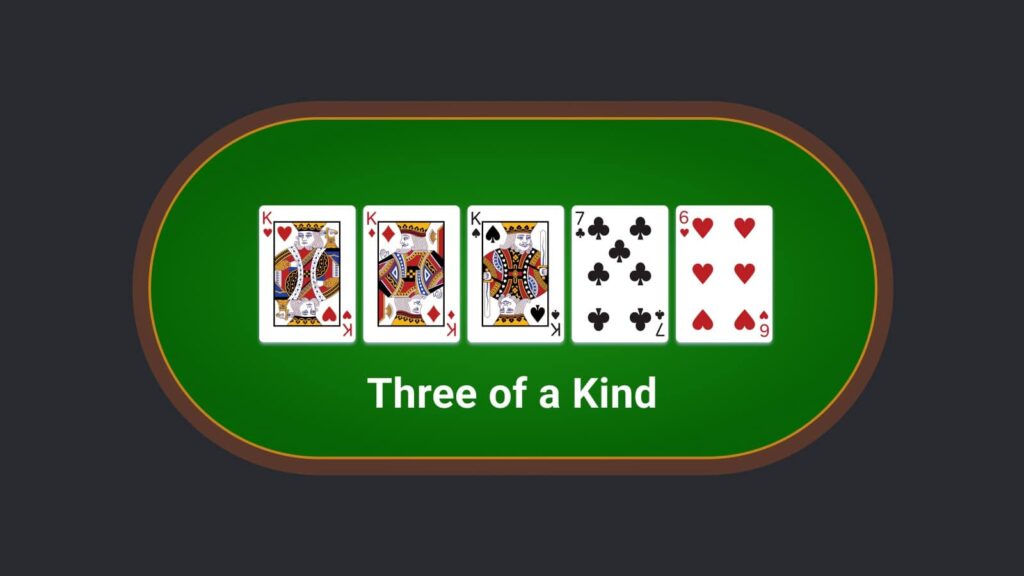
Tell
Any action or signal that reveals information about the strength of a player’s hand or cards is referred to as a “tell.” Traditionally, in live poker, a “tell” pertains to behavioral or body language clues that disclose information about a player’s hand. However, the term is also applicable in various contexts in both live and online poker, such as timing tells or bet sizing tells.
Tight
A style of play characterized by playing fewer hands but often stronger ones.
Tournament
A poker event where players compete until one person wins all the chips.
Trap
To play a strong hand passively in hopes that opponents will bet into you. Same as “Slow Play”.
U
Under the Gun (UTG)
The same as “Early position”. The seats to the left of the big blind in a poker game. Considered disadvantageous because you act at the beginning of a betting round, not having enough information about other players. There is 1 early position in a 6-max game (EP), and 3 early positions in a 9-max game.
Underdog
A hand or player that is statistically less likely to win. For example, in Texas Holdem, if you have 9♠ 8♠ and your opponent has Q♣ Q♦, you are the underdog pre-flop, as you have only 21% equity.

Underpair
A pocket pair lower than any of the cards on the board. For example, holding 6♦ 6♣ on a board of 8♠ 9♦ J♥ means you have an underpair.
Upswing
A period in which a player is experiencing a series of profitable hands or sessions. During an upswing, a player generates excess profits over a certain period. These are the very periods when poker luck is on your side.
V
Value Bet
A bet made to get a call from worse hands. For example, betting with K♥ J♥ on a K♦ 7♠ 3♣ board is a value bet if you believe your opponent might call with a worse King or a lower pair.
Variance
Variance measures how far a set of numbers differs from the mean. In poker, variance often refers to how “swingy” a game or strategy is relative to your win rate. Variance can also be defined as the square of standard deviation, usually measured in bb/100.
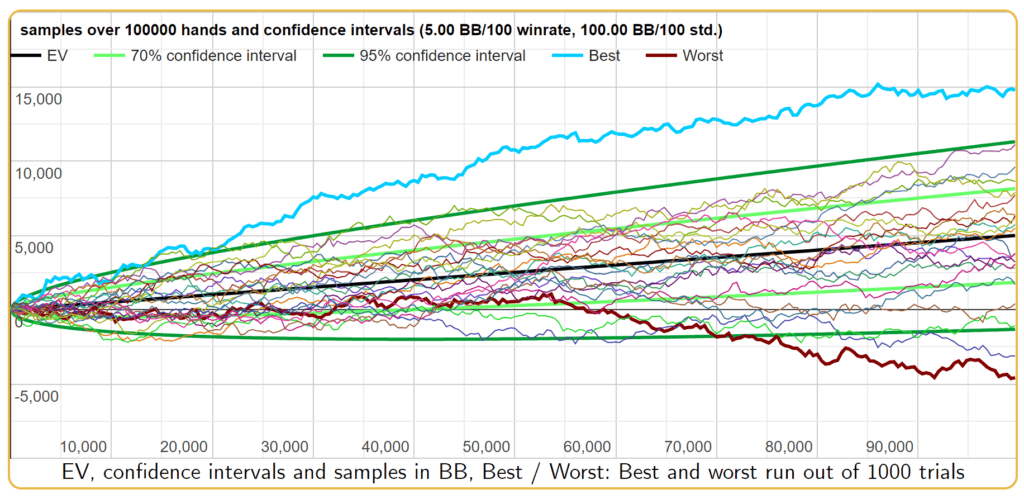
VPIP
An online poker acronym that stands for ‘Voluntarily Put In Pot’. A statistic that measures the frequency with which a player voluntarily puts money into the pot pre-flop. VPIP is the main poker stat that players use in the HUD software.
W
Whale
A wealthy, often inexperienced poker player who plays at high stakes.
Wheel
The lowest possible straight in poker: Ace, two, three, four, five. For example: A♣ 2♥ 3♣ 4♦ 5♠.
WTSD (Went to Showdown)
A poker statistic indicating how often a player sees the showdown.
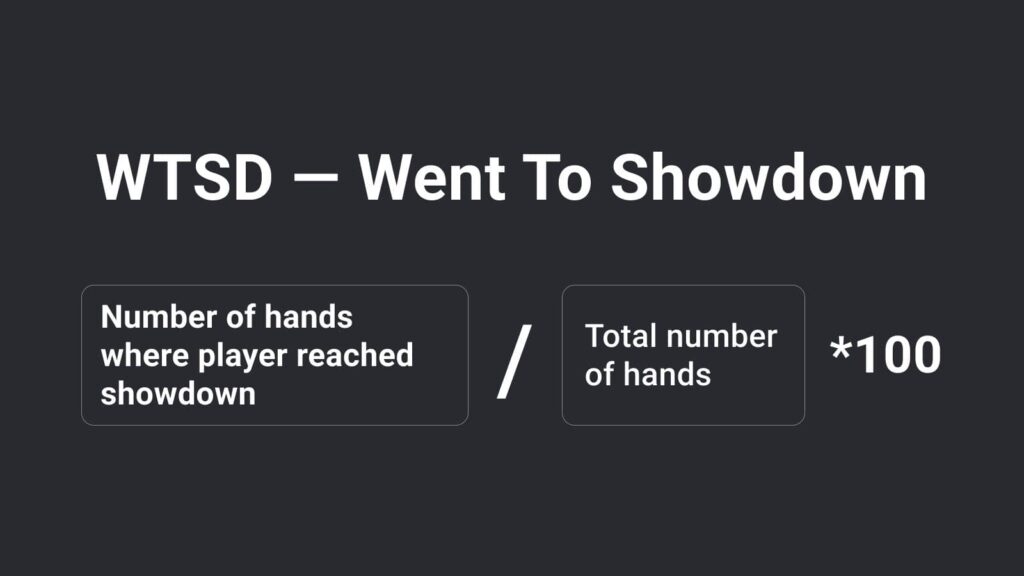
W$SD (Won at Showdown)
A poker statistic that tracks how often a player wins after seeing the showdown.
WWSF (Won When Saw Flop)
A poker statistic indicating how often a player wins when they see the flop.
Z
Zoom
A fast-fold poker format where players are moved to a new table with new opponents immediately after folding. Zoom format allows players to play way more hands in a shorter period than at regular tables.